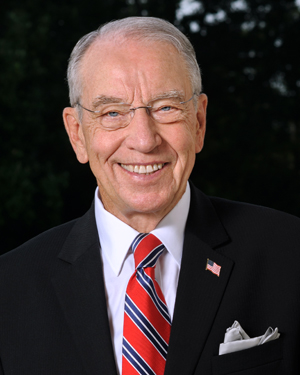The House and Senate Agriculture committees are setting up a likely battle over commodity payment limits after their respective farm bills get out of their respective chambers. The outcome could be a stalemate that leaves existing law in place.
The House farm bill loosens some key restrictions on payment eligibility, along with removing a cap on marketing loan gains and loan deficiency payments. And House Agriculture Committee Chairman Mike Conaway, R-Texas, successfully worked with GOP leaders to block any amendments to those provisions from being considered on the House floor.
However, Senate Agriculture Chairman Pat Roberts tells Agri-Pulse he is working with Sen. Chuck Grassley, the most prominent congressional advocate of tightening payment rules, to include his language in the draft bill that the Senate Agriculture Committee is expected to act on next month.
“We’ve talked about it at length and I think we can come up with something that hopefully Chuck can agree to,” Roberts said this week.
Grassley has long sought to restrict farm operations to having one non-farming participant who could qualify for $125,000 a year in subsidies as a manager. Rep. Mark Meadows, R-N.C., was unable to get a vote on an amendment to the House farm bill that would have added that restriction.
Iowa's senior senator posted a tweet on Saturday suggesting he might vote against the committee’s farm bill if it doesn’t tighten eligibility rules, saying he learned his lesson the last time the legislation was considered. “Why (should) I vote for a farm bill out of senate ag comm that doesn’t include my very strict payment limitations. It’s ridiculous that non-farmers can get millions of subsidies,” he wrote.
But Grassley knows that he goes into this battle in a weaker position than he was in 2013 when the final details of the 2014 farm bill were being negotiated. The House farm bill had been amended on the floor to include the same payment rules that Grassley had successfully pushed through the Senate.
The final version of the bill that emerged from the House-Senate conference committee wound up watering the provisions down significantly at the insistence of House negotiators. By protecting his bill from the Meadows amendment, Conaway has ensured that he will be going into the negotiations with the Senate with a stronger hand than did former House Agriculture Chairman Frank Lucas, R-Okla., going into talks on the 2014 law.
The 2014 law required USDA to more tightly define what it means to be “actively engaged” in farming for purposes of qualify for commodity payments. Family members, defined as siblings, spouses and linear descendants and parents and grandparents of the producer, were exempted.

Sen. Charles Grassley
Grassley said that a new report by the Government Accountability Office backs up his claim that existing rules are too loose. The report, prepared at Grassley’s request, found that USDA had distributed an average of $884,495 in payments to the 50 farming operations that received the highest payments in 2015. There were $2.7 billion in payments provided that year to 95,417 corporations, general partnerships, joint ventures, limited liability companies and other such entities.
Nearly 75 percent of general partnership members who qualified for payments did so because they said they contributed both management and labor to the operation, according to the report. Twenty percent provided only management.
The House bill would expand the family farm definition to include nieces, nephews and cousins.
Jennifer James, an Arkansas rice grower, told the Senate Agriculture Committee last year that that family farm definition was so restrictive it could disqualify operations from being considered family farms following the death or retirement of a lineal family member, such as parent or grandparent. “It was not the intent of Congress to force family farms out of eligibility as a result of family transitions,” she said.
Additionally, owners of LLCs and S corporations could qualify to receive up to $125,000 in payments each year. Currently such farms are subject to a single $125,000 payment limit. Conaway believes that would ensure that LLCs and S Corps are treated the same as joint ventures and partnerships, providing farmers more freedom in how they structure their operations.
The House bill also would exempt pass-through entities from the existing means test, which bars subsidies to individuals with adjusted gross income of more than $900,000 a year.
When Grassley was asked if the most he might accomplish this year is to preserve the provisions in the 2014 farm bill, he said, “I hope you’re wrong.” He went on to muse that easing the rules as Conaway wants might provoke a public backlash. “It would make the farm payments to Wall Street bankers so outrageous that maybe we could finally get some decent restrictions,” he said.
For more news, go to www.Agri-Pulse.com


